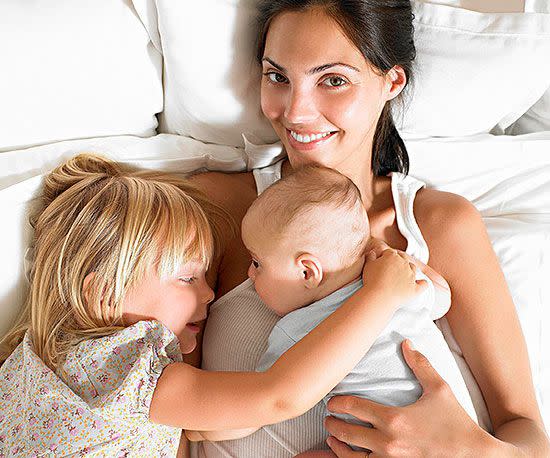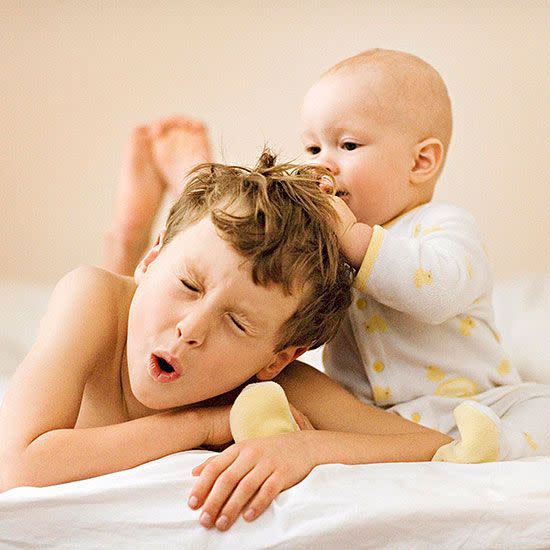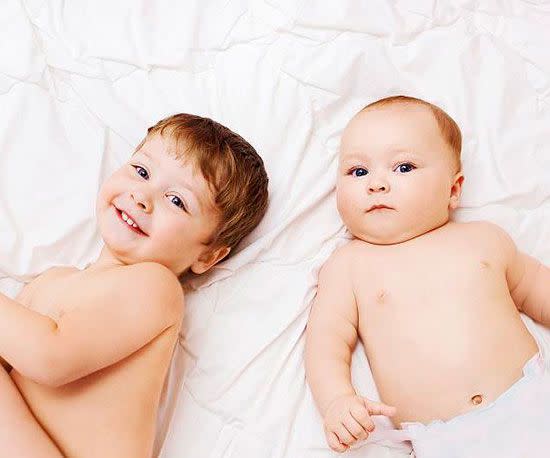Big-Sibling Blues

Ghisian & Maria David de Lossy/ Image Source
When I was pregnant with my second child, Isaac, a friend entertained me with a not-so-charming story: While her coworker's new baby -- also the second child -- was napping in the living room, the mother overheard her 3-year-old whisper to a friend, "When Mommy's in the kitchen, we can spit on him." I was horrified and determined to make sure that kind of jealousy didn't happen in my house. But while there was no spitting (that I know of, anyway), there was certainly envy.
At one point, my 3-year-old, Hannah, suggested with a sweet smile that we build her newborn brother "a really beautiful dog house in the backyard where he can live."
Of course, being jealous is a normal rite of passage for all firstborns. However, the way you handle it can affect whether your child comes to see his new sibling as a friend or a foe down the road. Our age-by-age guide will help your older child adjust to the new kid in town (and keep his spit to himself).
Big-Kid Age: Under 24 months
What you can expect
Like my son Isaac, who was 15 months old when his brother, Ben, was born, young children can seem almost clueless about the arrival of a new baby. (We may as well have brought home a pooping stuffed animal.) But it can be an emotionally rough road to become a big brother or sister before the age of 2. "This is by far the hardest time for the firstborn to accept a new baby," says Fran Walfish, Psy.D., author of The Self-Aware Parent. "Every child needs a full tablespoon of Mommy all to herself. Two years is a full tablespoon. Less than that can increase sibling jealousy and resistance to accepting the baby as a full member of the family." If your older child doesn't seem visibly upset by the baby's arrival, it's possible that she is still grieving the end of the way her life used to be. Often this grief doesn't show up as overt jealousy and tantrums until the baby becomes mobile and starts grabbing your older child's things.
How to handle it
Enjoy the calm for now, if that's what you've got, and be sure to schedule some time alone each day with your toddler, even if it's just a 15-minute story while the baby is in someone else's arms. Remind yourself to smile when your toddler comes into the room, just as you did before you were so exhausted. (It doesn't take much energy to grin and to give hugs and kisses to a little one who may need them.) Of course, toddlers can be an unreasonable bunch, new baby or no new baby. "Don't fall into the trap of negotiating or pleading with your child," says Dr. Walfish. If she whines that she wants you to pick her up but you're nursing the baby, tell her: "You're sad that I can't pick you up right now. I'm sad too. Come snuggle up next to me and the baby. And when I'm finished, let's hug!"
Recommended reading
I'm a Big Sister (or I'm a Big Brother), by Joanna Cole. A new big sister compares what she can do with what babies can do, then lets her parents know how special she is.
Waiting for Baby (New Baby), by Rachel Fuller. Create your own narrative as you flip through this board book showing a toddler who sees Mommy off to the hospital, meets the baby for the first time, and helps Daddy so Mommy can rest.
Birth Order Personality Traits

AE Pictures Inc/Getty Images
Big Kid Age: 2-3 years
What you can expect
Many children this age become weepy, whiny, or clingy, especially after the novelty of a new baby wears off. "Ever since my baby came home, one of my 3-year-old twins has been super jealous," says Amy Shoaff, of Westchester, California. "She'll say she wants powder on her bottom, which she sees me putting on the baby, and she screams until she gets it." Kids may want to nurse again if they've been weaned or to drink from a bottle when they've been happily using a sippy cup for months. Bedtime rituals may drag out and collide tragically with your baby's fussy period. Also, a child who has been sleeping in his own bed may suddenly want to sleep in yours, especially if the baby is in your room. And if he's been sleeping through the night he may start having nightmares or waking and wanting to get in on the action when he hears the baby at 3 a.m. "Most toddlers and preschoolers feel very conflicted about a new sibling. A part of them just wants to be a baby and another part, the part that says, 'I can do it myself,' wants autonomy and independence," notes Parents advisor Jenn Berman, Psy.D., author of The A to Z Guide to Raising Happy, Confident Kids.
How to handle it
Give words to your child's mixed emotions. Try something like, "It looks like you really want to be a baby now too," suggests Dr. Berman. And then let your older child play baby for a while. My daughter, Hannah, and I used to do this when Isaac was a newborn: She'd sit on my lap and I'd cradle her, legs spilling over the side of the rocking chair, as she said variations of "Googeegaga" until we both started to laugh. The more I let myself get into it, the funnier it became, which I suspect defused her sadness and helped her move on; she didn't ask to play baby more than a few times after that.
To help your child adjust to her new daily life, plan ahead while you're pregnant. "Bedtime routines inevitably are shortened when the new baby arrives," says Edward R. Christophersen, Ph.D., a clinical child psychologist at Children's Mercy Hospitals and Clinics, in Kansas City, Missouri. "So condense them ahead of time." If your child is used to Mommy getting him up and giving him breakfast, transition to Daddy doing it now and then before the baby is born. And Daddy should be sure to say how excited he is to have a turn with morning time. If the baby will be sleeping in your older child's crib, get him a toddler bed months before the baby arrives (or get another crib). It's also important to avoid blaming the baby for any negative changes in the house -- that's a recipe for resentment.
Recommended reading
On Mother's Lap, by Ann Herbert Scott. A comforting mom makes sure that there is enough room on her lap for Michael, his beloved toys, and -- when she cries -- his new sister.
Best-Ever Big Sister (or Best-Ever Big Brother), by Karen Katz. This lift-the-flap book teaches future big brothers and sisters about all that babies are capable of and how older siblings should be proud of their own accomplishments.

EA Niton/Veer
Big Kid Age: 4-6 years
What you can expect
Kids at this stage are often more understanding, and they can be pretty levelheaded about the introduction of a new sibling. So if the baby spits up on her, it's easier to explain that he didn't do it on purpose. And if the baby gets into her toys, you can help her put away her favorites so the baby can't reach them. (Toys that are a choking hazard must always be kept out of reach.) Kids in this age group have better coping skills, not to mention the ability to take turns or wait longer for a snack or a story. They also have more of a life of their own, between school, playdates, and activities. Your child's world is widening and she isn't so reliant on you to be her everything. That said, you're still the person to whom she's most attached; if she's not getting the attention she needs from you, she may fear she's being left behind and act up.
How to handle it
"One-on-one time with your older child is the best antidote to her fear of abandonment," says Dr. Berman. Even if it's just a trip to the grocery store, invite her to join you and leave the baby home with your partner if possible. And when the baby does things that might drive your older child nuts, be her advocate: Replace her torn book; let her shut out the wailing by listening to a soothing song on your phone. Say, "I know this is hard. Let's take a deep breath together."
Recommended reading
Babies Don't Eat Pizza, by Dianne Danzig. A charming, straightforward book that covers "wacky" baby hair, hospital bracelets, and the bottom line that eating pizza is a privilege that's only for older kids.
Julius, the Baby of the World, by Kevin Henkes. Lilly doesn't try to hide her jealousy as she tells her baby brother, Julius, that if he were a food he'd be a raisin and if he were a number he'd be 0. But Lilly's loyalty awakens when a cousin insults the baby.
Big-Kid Age: 7 to 8 years
What you can expect
If you ask your kid how his day was, he might just say, "Fine." It takes more effort to get children this age to talk and open up about what they are feeling, says Dr. Walfish. The challenge is to get them to express any jealousy that may lead to obnoxious behavior (such as defiance, back talk, or an overt disregard of the baby).
How to handle it
When my children were this age, my secret weapon for getting them to open up was a ten-minute snuggle before bed. While my kids told me basically nothing in the car on the ride home from school starting in first grade, they'd tell me a whole lot at 8:15 p.m. as we were unwinding by the glow of the night-light. Dr. Walfish recommends asking your child to remember what it was like to be the only child in the family and what's different about life now. You might ask what's hard and what's fun about the baby. If he lets on that he's feeling jealous, reassure him of your love and ask if there's something you can do to help. Or tell him about a time when you felt jealous of your own sibling. To help build your children's bond with each other, do your best to engage your older child with the baby. Invite him to help wrap a towel around the baby when you take her from the tub, to read the baby a story while you fold laundry beside them, or to distract her with a song during a squirmy diaper change. But be careful that you don't rely on him to be a junior babysitter, which could quickly become a burden.
Recommended reading
What to Expect When the New Baby Comes Home, by Heidi Murkoff. Angus the Answer Dog provides the inside scoop on important questions about the new baby, such as why he cries so much and gets so many presents.
What About Me? 12 Ways to Get Your Parents' Attention (Without Hitting Your Sister), by Eileen Kennedy-Moore, Ph.D. This book by a Parents advisor addresses sibling rivalry and envy by showing kids there are creative and kind ways to deal with feeling left out.
5 Ways to Help Your Child Adjust
Don't try to "fix" your child's negative emotions; just do the best you can to understand and accept them.
Feel free to be silly about the situation: "Yes, let's pretend to build a really nice dog house for the baby to live in! Maybe we can send Uncle Noah out there to live in it too!"
But don't be so silly (or silly so often) that you minimize her feelings.
Acknowledge it whenever he's being sweet with the baby.
Know that adjusting to a new baby is an ongoing process. If you're unsure of what to do, talk to a smart mommy friend who has older children, your pediatrician, or a counselor.
Celeb Siblings: The Age Gap
See which famous moms have the same spacing between their kids as you do!
1 year
Jessica Simpson's daughter, Maxwell, and son, Ace, are nearly 14 months apart.
Drew Barrymore's daughter Olive was 19 months old when little sister Frankie was born.
Brooke Burke-Charvet's youngest daughter, Heaven, is 14 months older than little brother Shaya.
2 years
Penélope Cruz's son, Leo, is two and a half years older than his sister, Luna.
Kristin Cavallari's son Camden is 21 months older than baby brother Jaxon.
3 years
Michelle Obama's daughters, Malia and Sasha, are three years apart.
Jennifer Garner's kids -- Violet, Seraphina, and Samuel -- are each separated by about three years.
4 years
Reese Witherspoon's two oldest kids, Ava and Deacon, are four years apart.
5 years
Halle Berry's daughter, Nahla, was 5 when Berry welcomed her son, Maceo.
6 years
Tina Fey's daughter Alice was almost 6 when the family welcomed baby Penelope.
7 years
Kate Hudson's sons, Ryder and Bingham, have about seven and a half years between them.
8 years
Jennifer Connelly's two youngest children, Stellan and Agnes, are about eight years apart.
9 years
Céline Dion's son René-Charles was almost 10 years old when his twin brothers, Eddy and Nelson, were born.
More than 10 years
Victoria Beckham's oldest son, Brooklyn, is 15, and her daughter, Harper, is 3.
-- Reported by Jacquie Itsines
